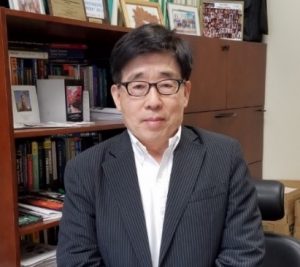October 20, 2020
 Join CAVS October 23 at 2:00 pm on Webex for a lecture with Dr. Yang-Ki Hong of University of Alabama’s Department of Electrical and Computer Engineering as he discusses Magnetics for Telecommunication and Electric Machines.
Join CAVS October 23 at 2:00 pm on Webex for a lecture with Dr. Yang-Ki Hong of University of Alabama’s Department of Electrical and Computer Engineering as he discusses Magnetics for Telecommunication and Electric Machines.
Abstract:
First, cars powered by internal combustion engines (ICEs) will be phased out to reduce fuel emissions, thereby addressing global warming and air pollution issues in the cities and improving fuel economy. J. P. Morgan recently reported that by 2030, the market share of electric vehicles (EVs) and hybrid electric vehicles (HEVs) would account for an estimated 60 % of all cars [https://www.jpmorgan.com/global/research/electric-vehicles].
EVs are more digitally connected than conventional vehicles ever. Many millions of networked autonomous vehicles will operate with different coordinate degrees to make transport and logistics as efficient as possible in 2030 [6G Research Visions 1, University of Oulu, September 2019]. These vehicles include autonomous cars that help people move between their homes and workplaces or schools and autonomous trucks or drones that deliver goods. The autonomous passenger cars, trucks, and drones have demands, such as compact, low-cost, lightweight electric machines’ high efficiency.
Second, by 2025, the globe will connect billions of Internet of Things (IoT) devices and create more than 90 ZB (1 Zettabyte = 1021 bytes) of information data within five years [https://www.seagate.com/our-story/data-age-2025/]. Connected autonomous vehicles will use part of these data. Accordingly, the compact, efficient telecommunication technology with an extremely high data transfer rate is rapidly advancing to keep pace with the networked autonomous vehicles’ trend. Wireless networks must deliver ultra-high reliability and the V2X (vehicle-to-everything) communication capability, in addition to low latencies and high bandwidth, to operate the car network system effectively and safely.
Lastly, in response to the rapid growth of autonomous EVs, information data, and the networked autonomous vehicles, we have launched research projects, including rare-earth free magnetic materials for electric machines and power electronics, RF devices, permanent magnet motors, motor controllers, CubeSat antenna for a small satellite, radio location and channel sounding, and the concept of space superhighway transportation. This lecture will introduce those projects and identify some issues on electrified vehicles and telecommunication systems.
Biographical Notes:
Dr. Yang-Ki Hong is the E. A. “Larry” Drummond Endowed Chair Professor of the Department of Electrical and Computer Engineering (ECE) and a Professor of Materials Science Ph.D. Program and was the Graduate Program Director (Aug. 2013 – July 2020) of the ECE Department at The University of Alabama (UA). He is currently serving as the Director of NSF (National Science Foundation) Industry-University Cooperative Research Center (IUCRC) – UA: Center for Efficient Vehicles and Sustainable Transportation Systems. He received his Ph.D. in Metallurgy from The University of Utah, Salt Lake City, UT in 1981 and BS in Physics and MS degree in Condensed Matter Physics from Yonsei University, Seoul, South Korea. Dr. Hong completed the Program for Management Development (PMD) of the Graduate School of Business Administration, Harvard University, Boston, MA, in 1992. Before joining the University of Alabama in 2006, Dr. Hong was a Professor of Materials Science and Engineering and an Adjunct Professor of Electrical Engineering at The University of Idaho, Moscow, ID and the Senior Vice President for R&D of OCI Company Limited, Seoul, South Korea. Dr. Hong has published 170 refereed journal papers and presented 240 papers at conferences and symposia. He also holds 19 US patents, 9 Korea patents, and 5 US provisional patents in magnetic materials and magnetic devices.
Dr. Hong is a member of the National Academy of Inventors, the New York Academy of Sciences, the CIGRE (International Council on Large Electric Machines), and the editorial review board of IEEE Magnetics Letters. He served on the Technical Committee of the IEEE Magnetics Society (2012 – 2017). Recently, Dr. Hong delivered a keynote speech at The 12th International Conference on Ferrites (ICF-12, 2019) and wrote a book chapter (92 pages) entitled, “Ferrites for Passive RF Devices,” in Solid State Physics (2013). Dr. Hong served on many international conference program committees and chaired sessions, including Chair of Power Magnetics/Advanced Machines session of the 64th Annual Conference on Magnetism and Magnetic Materials ( 2019), Chair of Motors and Automotive Applications session of the 2019 Joint Magnetism and Magnetic Materials (MMM)/IEEE International Magnetics Conference, Advisory Committee for the 5th Inter. Conf. of Asian Union of Magnetics Societies (IcAUMS 2018), Program Committee for the 62nd Annual Conference on Magnetism and Magnetic Materials (2017), and Publication committee chair for the 2016 IEEE International Conference on Microwave Magnetics.
Dr. Hong’s current research focuses on electromagnetics, rare-earth-free permanent and soft magnets for electric machines and power electronics, permanent magnet motor and magnetic supercapacitors for electrified vehicles, and RF devices (HF/VHF + DSRC + 5G + 6G antennas, inductors, GHz circulators).
For further information contact: Samee U. Khan | skhan@ece.msstate.edu | 662.325.0617
WebEx link for the lecture